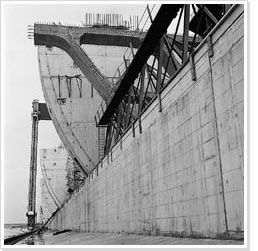The Delta Works as seen through Aart Klein's camera > The Delta Works
 On 18 February 1953, Mr J. Algera, at the time Minister of Transport and Public Works, set up the Delta Committee. The Delta Act was passed by the Dutch Parliament in 1957. A year later, the Senate and Queen Juliana gave their assent. At that time, the costs were estimated at 3.3 billion guilders, an enormous sum (especially for a country undergoing postwar reconstruction) that would be exceeded before the project’s completion. On 1 May 1956, the Delta Service was created as a branch of the Department of Transport and Public Works. The Delta Service was of an extremely complex nature, having to adjust existing plans continuously in view of changing insights and both political and economic factors.
On 18 February 1953, Mr J. Algera, at the time Minister of Transport and Public Works, set up the Delta Committee. The Delta Act was passed by the Dutch Parliament in 1957. A year later, the Senate and Queen Juliana gave their assent. At that time, the costs were estimated at 3.3 billion guilders, an enormous sum (especially for a country undergoing postwar reconstruction) that would be exceeded before the project’s completion. On 1 May 1956, the Delta Service was created as a branch of the Department of Transport and Public Works. The Delta Service was of an extremely complex nature, having to adjust existing plans continuously in view of changing insights and both political and economic factors.
Between 1954 and 1988, work on the Delta Plan included the construction of a large number of primary dams (in the Haringvliet estuary) and secondary dams (farther inland), ‘compartmentalizing works’ and roads.
From the very beginning, however, the Plan was subject to criticism. The Katholieke Volkspartij KVP (Roman Catholic People’s Party) was opposed to the Delta Act because it meant more state interference. The Contact Commissie voor Natuur- en Landschapsbescherming (Contact Committee for Nature and Landscape Conservation) feared that closing off the estuaries completely would have far-reaching consequences for the environment. The youth branch of the protestant Anti-Revolutionaire Partij ARP (Anti-Revolutionary Party) too was concerned about the future of fishery and shellfish. However, the authors of the Delta Act were not too concerned with the environmental consequences. A turn in this attitude did not come about until the end of the 1960s, when the unique nature reserve of De Beer had to be given up for enlargement of the port of Rotterdam. The first action groups came into being around 1970, and slowly but surely the government began to lend an ear to their arguments. Ecology started to play an ever more important role in the further development of the Delta Works.
Ideas about water conservation changed not only as a result of the negative effects the Delta Works had on the environment (blue-green algae, fish mortality et cetera), but also because rising sea levels and the large quantities of water the rivers carry down also called for new solutions.
